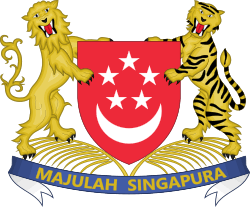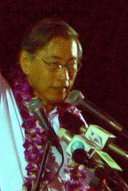1984 Singaporean general election
General elections were held in Singapore on 22 December 1984. The result was a victory for the People's Action Party, which won 77 of the 79 seats, marking the first time since 1963 that at least one opposition candidate was elected to parliament, although the first presence of opposition was in 1981.
| |||||||||||||||||||||||||||||||||||||||||
79 (Only 49 contested) seats to the Parliament of Singapore 40 seats needed for a majority | |||||||||||||||||||||||||||||||||||||||||
|---|---|---|---|---|---|---|---|---|---|---|---|---|---|---|---|---|---|---|---|---|---|---|---|---|---|---|---|---|---|---|---|---|---|---|---|---|---|---|---|---|---|
| Turnout | 95.6% | ||||||||||||||||||||||||||||||||||||||||
| |||||||||||||||||||||||||||||||||||||||||
| |||||||||||||||||||||||||||||||||||||||||
 |
|---|
| This article is part of a series on the politics and government of Singapore |
|
|
|
Related topics |
|
|
Background
In his 1983 National Day Rally speech, Prime Minister Lee Kuan Yew lamented that declining birth rates and large number of graduate women remaining single or not marrying their intellectual equal could see Singapore's talent pool shrink. The PAP government then proceeded to launch the "Graduate Mother Scheme" to entice graduate women with incentives to get married and grant graduate mothers priority in the best schools for their third child.[1] The proposal was met with anger by the Singapore public (including many female graduates) and the PAP government drew accusations of elitism. Notably, prominent PAP stalwarts like Deputy Prime Minister S. Rajaratnam and also ex-minister Toh Chin Chye expressed opposition to the proposal.[2][3]
In March 1984, Health Minister Howe Yoon Chong released a controversial proposal to raise the age for the withdrawal of Central Provident Fund (CPF) savings from 55 to 60 years. At a news conference on 26 March 1984, Howe reasoned that Singaporeans could not depend only on their children in their old age. That suggestion, part of the 54-page report of the Committee on the Problems of the Aged[4] which he chaired, was eventually dropped. Taking up the suggestions in the report, the Singapore Government subsequently introduced the Minimum Sum scheme. This allows workers to withdraw some of their CPF funds at age 55, setting aside a certain minimum sum which can only be withdrawn at retirement age, currently at 62 years.[5][6]
These controversial proposals sparked debate and uproar in the Singapore electorate and were said to have contributed to a big dip in PAP's support and its share of votes plunged by more than 10% to below 65%, the biggest fall and the lowest for PAP since the 1963 General Election. In his memoirs, Lee Kuan Yew recalled that the swing against the PAP was larger than what he expected.
New candidates/outgoing incumbents
Minister of Finance Hon Sui Sen died during his term on 14 October 1983 and his seat of Havelock was vacated, but no by-election was held on the constituency, and announced to be merged into Delta constituency. Tony Tan succeeded Hon as the new Finance Minister.
PM Lee's son Lee Hsien Loong (who went on to become the nation's third (and current) Prime Minister) made his debut in the seat of Teck Ghee, while PAP stalwarts Dr Goh Keng Swee and Ong Pang Boon stepped down. In the only election among several preceding and succeeding ones, the election deposit ($1,500) remained unchanged. The Workers' Party of Singapore (WP) secretary-general J. B. Jeyaretnam successfully retained the Anson constituency with an increased majority, while the Singapore Democratic Party made its first in-road into Parliament with the victory of Chiam See Tong, who would serve the Potong Pasir Single Member Constituency for the next 26 years until 2011.
Non-Constituency Member of Parliament scheme
A new Non-Constituency Member of Parliament scheme was introduced whereby between three and six seats, the exact number which was decided by the President of Singapore, would be offered to unsuccessful opposition candidates with the best scores and who garner at least 15% of the votes if any one party wins all the seats, subtracting one NCMP seat for every one opposition MP elected. Opposition parties dismissed the scheme for misleading voters into thinking that they could have opposition MPs without voting for them. M.P.D. Nair of WP who contested Jalan Kayu was the first to be offered but declined. The offer was then made to Singapore United Front's Tan Chee Kien who contested Kaki Bukit, who also declined, and no further offers were made.
Timeline
| Date | Event |
|---|---|
| 4 December | Dissolution of the 5th Parliament |
| 12 December | Nomination Day |
| 22 December | Polling day |
| 25 February 1985 | Opening of 6th Parliament |
Electoral boundaries
The newer constituencies are those with rapid developments of Ang Mo Kio, Tampines, Jurong East, Bedok & Jurong West (smaller developments), while other constituencies were dissolved, which was reflected in the table:
| Constituency | Changes |
|---|---|
| New Constituencies | |
| Bo Wen | Formed from Ang Mo Kio, Kebun Baru & Yio Chu Kang |
| Changkat | Formed from Tampines & Kaki Bukit |
| Eunos | Formed from Kaki Bukit & Tampines |
| Fengshan | Formed from Bedok, Kampong Chai Chee & Tanah Merah |
| Hong Kah | Formed from Boon Lay |
| Teck Ghee | Formed from Ang Mo Kio & Chong Boon |
| Yuhua | Formed from Boon Lay & Bukit Timah |
| Defunct Constituencies | |
| Bukit Ho Swee | Absorbed to Tiong Bahru and Kim Seng |
| Havelock | Absorbed to Delta |
| Katong | Absorbed to Joo Chiat and Mountbatten |
New/Outgoing MP
| Outgoing MPs | New MPs |
|---|---|
Retiring
Deceased
|
|
^Note : A caret indicates that the constituency was removed and absorbed to other wards.
Results
Excluding the 30 uncontested constituencies, the voter turnout was 95.6%, with 63.2% of the total electorate casting their votes.[7]
| Party | Candidates | Votes | % | Swing | Seats | +/– |
|---|---|---|---|---|---|---|
| People's Action Party | 79 | 568,310 | 64.8 | -12.9 | 77 | +2 |
| Workers' Party | 15 | 110,868 | 12.6 | +6.4 | 1 | +1 |
| Singapore United Front | 13 | 87,237 | 10.0 | +5.7 | 0 | 0 |
| Singapore Democratic Party | 4 | 32,102 | 3.7 | +1.9 | 1 | +1 |
| United People's Front | 8 | 27,217 | 3.1 | -1.4 | 0 | 0 |
| Barisan Sosialis | 4 | 24,212 | 2.8 | +0.2 | 0 | 0 |
| Singapore Justice Party | 2 | 10,906 | 1.2 | +0.4 | 0 | 0 |
| Pertubuhan Kebangsaan Melayu Singapura | 1 | 4,768 | 0.5 | -1.6 | 0 | 0 |
| Angkatan Islam | 1 | 359 | 0.0 | New | 0 | New |
| Independents | 3 | 10,586 | 1.2 | New | 0 | New |
| Invalid/blank votes | - | 26,394 | – | – | – | – |
| Total | 130 | 909,980 | 100 | - | 79 | +4 |
| Registered voters/turnout | - | 944,624 | 95.6 | – | – | – |
| Source: Singapore Elections | ||||||
References
- "Policies for the bedroom and beyond". Today. 23 March 2015. Retrieved 7 April 2020.
- "Policies for the bedroom and beyond". Today. 23 March 2015. Retrieved 7 April 2020.
- "Reproductive Rights". AWARE. Retrieved 7 April 2020.
- Committee on the Problems of the Aged (1984). Problems of the Aged : Report of the Committee on the Problems of the Aged. Singapore: Ministry of Health. ISBN 9971-88-022-9.
- "Former Cabinet Minister Howe Yoon Chong dies at age 84". Channel NewsAsia. 21 August 2007. Retrieved 21 August 2007.
- "Late Howe Yoon Chong cared deeply for country's development: PM Lee". Channel NewsAsia. 22 August 2007. Retrieved 23 August 2007.
- Dieter Nohlen; Florian Grotz; Christof Hartmann (15 November 2001). Elections in Asia and the Pacific : A Data Handbook: Volume II: South East Asia, East Asia, and the South Pacific. OUP Oxford. p. 255. ISBN 978-0-19-924959-6.


